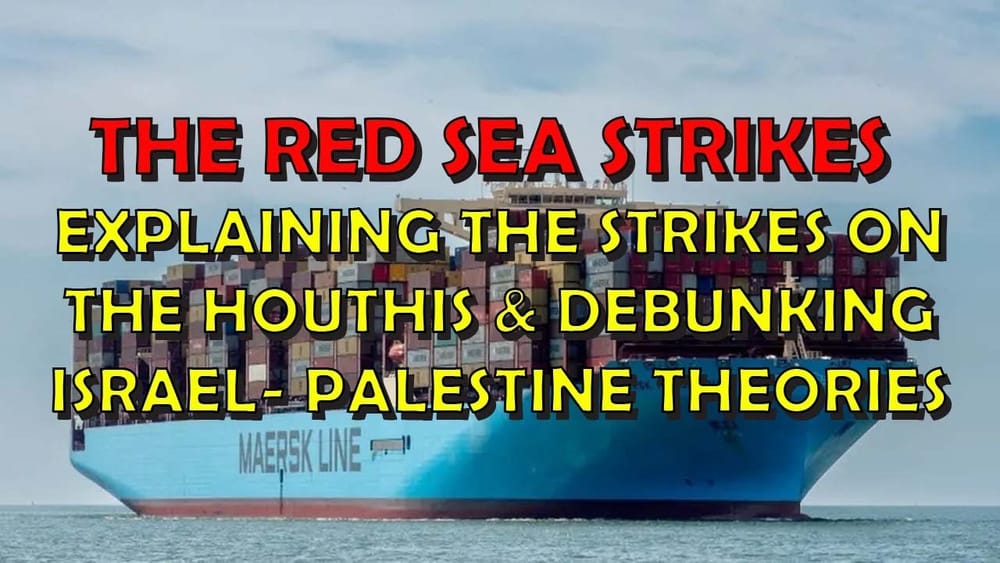Red Sea Strikes on the Houthis: Explainer Debunking Israel-Palestine Theories
Table of Contents 📖
Hello Team
🎦 00:00-00:28⏩
Jonathan introduces the video, stating it's a geopolitical update and an explainer about the US and UK airstrikes on the Houthis. He aims to debunk some theories and explain the reasons behind the strikes.
Return to top⤴️
Debunking Misconceptions About US Airstrikes
🎦 00:29-02:10⏩
Jonathan addresses the misconception that the US President needs Congressional approval for airstrikes in Yemen, highlighting that Congress acknowledges the President's executive power to act against terrorism.
Return to top⤴️
Addressing False Narratives and the Red Sea Attacks
🎦 02:11-03:46⏩
Jonathan challenges false narratives surrounding the strikes, particularly those linking them solely to protecting Israel. He points out that the Houthis have attacked numerous international ships, not just Israeli ones, and that these attacks have global economic implications.
Return to top⤴️
The Global Economic Impact of the Red Sea Attacks
🎦 03:46-08:08⏩
Jonathan emphasises that the Red Sea is a vital global trade route and disrupting it impacts everyone. He cites the UK Treasury's concerns about rising oil and gas prices due to attacks on shipping. He highlights that increased costs for cargo companies are passed down to consumers, leading to inflation. Jonathan explains that global companies like Maersk, Tesla, Ikea, and Tesco are already experiencing challenges due to the attacks, further illustrating the economic consequences.
Return to top⤴️
The Role of Armed Forces in Protecting Economic Interests
🎦 08:08-10:01⏩
Jonathan argues that armed forces primarily defend national interests, particularly economic ones. He references his 2018 article, "The Armed Forces and Their Remit, Corporations and Morality," where he asserts that the UK armed forces exist to protect economic prosperity. Jonathan uses historical examples, like the Royal Navy protecting trade routes in the 1700s and efforts against Somali pirates, to illustrate this point.
Return to top⤴️
Iran's Involvement and the Houthi Narrative
🎦 10:01-13:30⏩
Jonathan discusses the complex geopolitical situation, acknowledging the Houthi connection to Iran. He cites analysis from BBC Security Correspondent Frank Gardner, who explains that Iran supports the Houthis. Jonathan notes that while Iran's involvement adds complexity, the core issue remains about economics and trade. He emphasises that this is not solely about Israel, despite attempts to frame it as such.
Return to top⤴️
Deconstructing the Houthi Propaganda and Its Appeal
🎦 13:30-16:25⏩
Jonathan further debunks the Houthi narrative, pointing out their claims of targeting Israeli ships don't match reality. He cites Patrick Bury, a former British Army officer, who observes that the Houthis are attacking various ships and spinning a narrative to align themselves with pro-Palestinian sentiment. Jonathan acknowledges the anger towards the West in the Arab street, highlighting how the Houthis are leveraging this sentiment through their propaganda. He reiterates that the US and UK actions are primarily driven by economic concerns, not by an allegiance to Israel.
Return to top⤴️
Wrap up
🎦 16:25-16:31⏩
Jonathan concludes by summarizing his perspective and encouraging viewers to engage with the content.
Return to top⤴️
"This is essentially nothing to do with Israel. You can continuously link it, but it's to do with economics. And if you don't understand that, you don't understand reality. "

